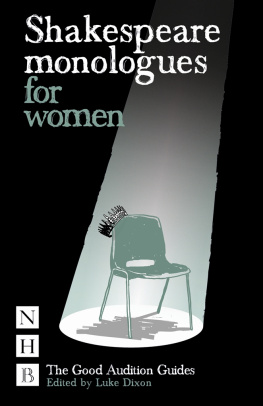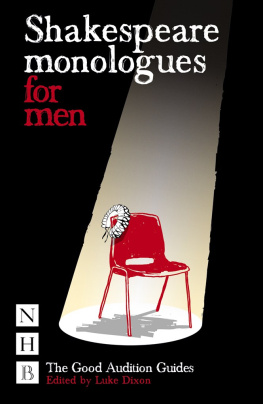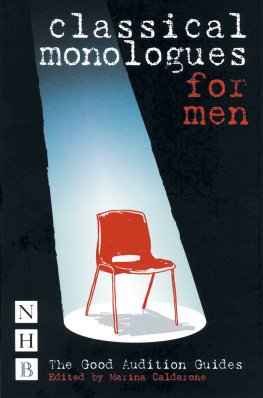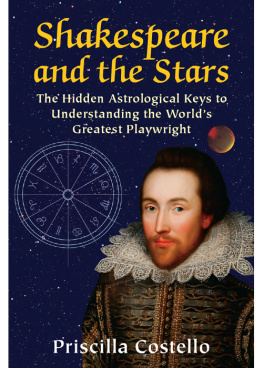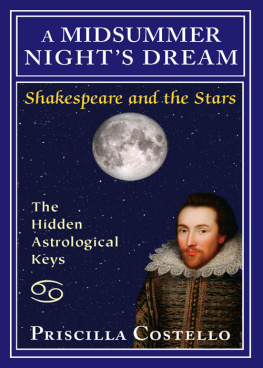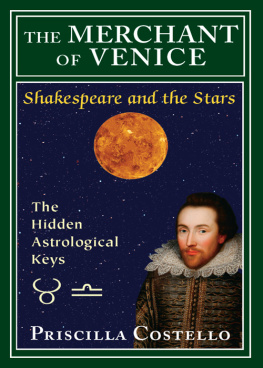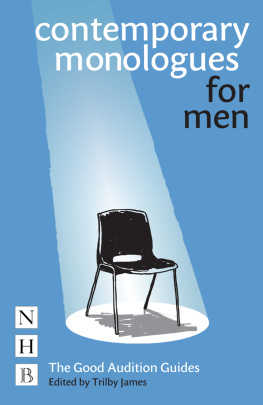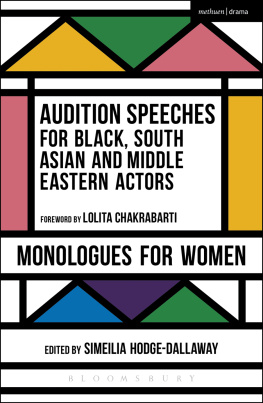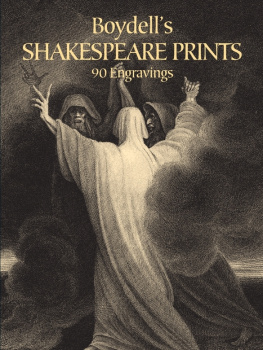
Introduction
WHY SHAKESPEARE? The basic requirements for most auditions, from drama-school entry to a season at the recreated Globe Theatre in London, will include performing a speech by Shakespeare. Faced with the thirty-eight plays that are generally considered to have been written by Shakespeare, it is daunting for even the most experienced actor to know where to begin finding a suitable speech. Thirty-six of those plays were collected after Shakespeares death by his colleagues and printed in what is known as the First Folio, a folio being the size of the sheet of paper it was printed on. Around 750 copies were produced and they sold for 1 each. About 230 still exist and now sell for around 3 million each. A couple of other plays only appeared in what are known as quarto editions, on paper folded to half the size of a folio sheet.
The Shakespearean canon, all the plays he wrote which have survived, is the heart of English drama. A speech from one of those plays can provide an actor with opportunities to show off their skills and talent in a whole range of ways: vocally and physically, in terms of characterisation and storytelling, emotionally and intellectually. A speech by Shakespeare is the best tool for an actor to demonstrate their craft, and for an audition panel or director to appreciate and judge it. CHOOSING YOUR MONOLOGUE In this volume I have brought together fifty speeches, from some of the best known to the least common. You will never find a new Shakespeare speech. Fashion and contemporary performance are factors that can make speeches appear current and popular.
It is also best not to second-guess what speech the actor before or after you will perform. Best to find a speech that you like, enjoy performing and can in some way empathise with. Do not worry about what other actors are doing. Choose more than one speech (maybe one comedy, one history and one tragedy) to have in your repertoire so that you always have something suitable when the call comes. Having chosen a speech, you must read the play and find the backstory so you know where the character and the speech are coming from. Complexity Some of the speeches in this book are relatively simple and might be more useful for the actor for whom Shakespeare is a new and terrifying experience: Miranda in The Tempest and Joan la Pucelle in Henry VI, Part One, perhaps fall into this category.
Others, like Lady Macbeth and Helena in Alls Well That Ends Well, are rich and complex in their language, thought and emotion and might be more suitable for actors seeking a challenge or needing to show the full range of their abilities. Age It is rare that we know the age of a character in a play by Shakespeare. Juliet we are told is fourteen. Otherwise ages are for the most part relative. The Countess in Alls Well That Ends Well is older than Helena, whom she has just taken into her care. Lady Macbeth tells us that she has once given suck to a child, which implies both age and a backstory that Shakespeare does not reveal in his play.
In a production the director will make decisions about the age of his characters and their relative ages to each other, and may ask you to approximate a particular age. In an audition you can be much more flexible in deciding whether the speech of a character is suited to you and your playing age. To give you some guidance I have listed below younger and older characters whose speeches are in this book. I have done the same with status (higher and lower) and with lists of mothers and daughters (another indicator of age and status). I have also identified the speeches with the most obvious comic potential. Gender None of these speeches were written to be acted by a woman.
Actresses did not exist in Shakespeares theatre, and all the plays were written to be acted by men and boys. Gender and the dissemblance of gender are important themes through many of the plays. There are speeches here, both comic and serious, which give you plenty of opportunity to play with gender, from Joan la Pucelle in Henry VI, Part One, to Viola in Twelfth Night and Imogen in Cymbeline. I have included Rosalinds epilogue speech from As You Like It in which the gender of the actor is confused not for the other characters in the play but for the audience itself. Length The speeches vary considerably in the number of words, but not necessarily in the time they take to perform. Hermias short speech in A Midsummer Nights Dream, when she wakens lost in the woods, though short of words, contains a great deal of implied action, and the action becomes as important as the words when you are performing it.
It is a speech that needs to be given space to breathe and for the spaces and silences within it to be found. Cressida also has comparatively few words, yet her awkwardness and uncertainty means it takes what seems to her an eternity to deliver. In these and many other speeches there are important moments when the character is listening (Imogen in Cymbeline before she enters the cave) or when she is waiting for or expecting a reply (Portia in Julius Caesar and Marina in Pericles). Where some speeches are too long for audition purposes I have, as judiciously as possible, made cuts. LANGUAGE Shakespeares audiences went to hear plays. It was not until long after his death that anyone wrote of going to see a play.
So the sounds of Shakespeares words are as important as their meanings. Indeed they often help convey the meanings. Enjoy and play with the sounds as you work through the speeches. Prose is everyday speech but Shakespeare often heightens that speech, giving it colour, richness, images and so on that we would not use in our everyday lives. Poetry is where that heightened use of language is taken further and the speech goes beyond the everyday, and rhythm and rhyme become important. Iambic pentameter is a particular kind of verse. Iambic pentameter is a particular kind of verse.
An iamb is where a short syllable is followed by a long syllable giving a di-dum rhythm. Metre is how rhythms are organised in lines of verse. Penta is the old Greek word for five. So if you put five iambs in a line of verse you get an iambic pentameter: di-dum, di-dum, di-dum, di-dum, di-dum This was the main form Shakespeare used in writing his plays: they are the heartbeat of his language. Sometimes it is used rigidly and is easy to spot: How happy some oer other some can be! Through Athens I am thought as fair as she. (Helena, A Midsummer Nights Dream) Sometimes, especially as he got older and more experienced, Shakespeare played with the form and pulled it around for emotional, dramatic or characterisation effect.
In order for the rhythm to work, a word ending in ed will sometimes have the letters stressed as a syllable, in which case it is printed d, and sometimes it will not be a separate syllable but be spoken as if the e is not there, in which case it is printed d. Rhyming couplets Sometimes Shakespeare uses rhyme and when two lines together rhyme we have a rhyming couplet. Often these are used at the end of a speech or scene to indicate finality. Punctuation in Shakespeare is a controversial subject. Shakespeare did not prepare his plays for publication and therefore the punctuation in the texts is largely put there by his colleagues or the publisher or printer. Vocabulary Shakespeare wrote at a time when English as we know it was developing rapidly. Vocabulary Shakespeare wrote at a time when English as we know it was developing rapidly.
Next page
